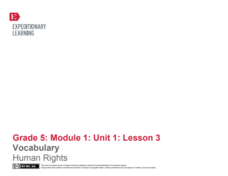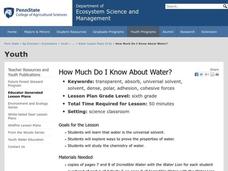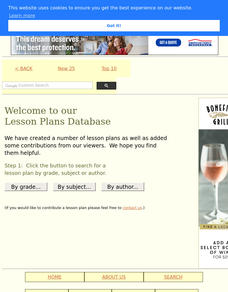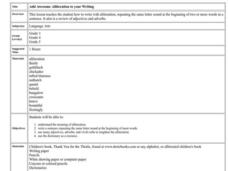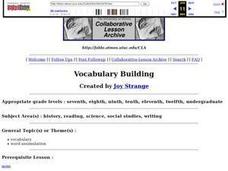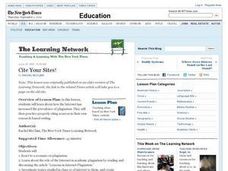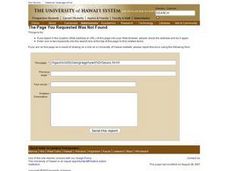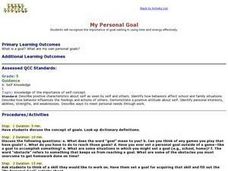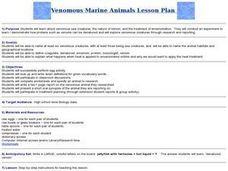Shodor Education Foundation
Sets and the Venn Diagram (Beginner)
Venn diagrams are helpful in understanding the idea of a set and using attributes to sort items. This basic plan is an introduction with an added bonus of an applet that can be used to demonstrate the activity. If a classroom of...
EngageNY
Vocabulary: Human Rights
Your class continues to explore the history of the Universal Declaration of Human Rights. In addition to learning about the background of this text, learners work on the skill of identifying and understanding key academic vocabulary....
Curated OER
Child Safety
Explore reading comprehension and child safety in this young adult literacy lesson. High schoolers practice using context clues to figure out word meanings after observing a teacher model this process. They read an article about child...
Curated OER
Pet Guess Who
Est-ce que ton animal grand ou petit? Pair up your beginning French speakers for a game of Pet Guess Who! Using pet advertisements from newspapers or the Internet, pairs try to guess what kind of animal their partner has. Also, use the...
Curated OER
"C" Unit
Explore the letter C and the concept of courage with your class. In this religious lesson plan, learners are introduced to the concept of courage through stories from the Bible and then have a variety of multi-disciplinary activities...
Curated OER
How Much Do I Know About Water?
Sixth graders explore how water behaves on a penny. In this states of matter lesson, 6th graders observe water as they add drops to a penny. This lesson helps students apply the adhesive properties of water to the water cycle.
Curated OER
How Much Do I Know About Water?
Sixth graders explore ways to analyze the properties of water and examine the chemistry of water. In this water lesson students work in groups and complete several activities.
Curated OER
Add Awesome Alliteration to your Writing
Students practice writing with alliteration, repeating the same letter sound at the beginning of two or more words in a sentence; students also review of adjectives, verbs, and adverbs while creating an alphabet book.
Curated OER
Add Awesome Alliteration to Your Writing
Students explore alliteration. In this writing lesson, students read the book Thank You for the Thistle and create sentences with alliteration. Students create an alphabet booklet with alliteration.
Curated OER
Vocabulary Building - Declaration of Independence
Young scholars read the first part of the Declaration of Independence and mark the words they don't know. First, they try to guess what the words mean by looking at the them in context, and then they look up the words in a dictionary.
Curated OER
Cite Your Sites
What information would you find in an almanac that you would not find in an atlas? What is the difference between a dictionary and a thesaurus? Using a Cite Your Sites worksheet on which they record their observations, groups participate...
Curated OER
Planning A Vacation Online
If you could travel anywhere in the United States, where would you go? Use this question to interest your fourth, fifth, and sixth graders as they experiment with Mapquest or other direction-based resources. They choose where they'd like...
Curated OER
Color Mixing
Students experiment with primary colored water to mix new colors. They record new colors on a simple data sheet and share opinions on their work.
Curated OER
Geography With Dr. Seuss
Learners read the book, The King's Stilts by Dr. Seuss and discuss the geographical information given in the book. Then they discuss and locate on a map the physical features that make up the continent of Africa. They create an original...
Curated OER
Identifying Sea Ice
Students study different types of sea ice and interview an Yupik elder or local hunter. In this sea ice lesson, students study the native language for sea ice terms. They interview an elder from Alaska's northern coast about their...
Curated OER
Flow Charts
Students explore the use of flow charts and cyclical diagrams. They discuss how to read the charts. Students produce a simple flow chart or diagram to explain a process. They investigate various methods used to present text.
Curated OER
Silent Letters
Students know and apply methods to help learn and remember correct spellings. Students relate certain spelling of words to the Harry Potter knight bus story. Students express what exactly silent letters are and how to identify them.
Curated OER
My Personal Goal
Fifth graders use goal setting in order to use time and energy efficiently.
Curated OER
Identifying Implications
Students read a variety of reading passages and articles. They investigate how to make implications and assumptions using the information provided.
Curated OER
The Language of Deception
Young scholars examine how to distinguish between different uses of language. They explore the difference between the cognitive meaning and the emotional meanings of a word. Each student evaluates the effects of euphemism in altering the...
Curated OER
Re-Viewpoints From 2002
Students explore how editorials use various devices to convey a message to a reader. They select key news topics from 2002 and write their own editorials.
Curated OER
Save the Library!
Pupils discuss library resources and how to locate them by answering various scenarios. Role-playing as librarians, they write essays stating five reasons why the library should not be closed down.
Curated OER
Venomous Marine Animals
Students name and describe six venomous marine animals. After participating in an activity, they define new vocabulary words. In groups, they complete worksheets to use while researching a specific venomous animal of their choice. ...
Curated OER
Predicting the Meaning of Unfamiliar Words in a Text
Middle schoolers develop strategies for what to do when they come upon words in a text that they don't know. After a class discussion, pupils are given a selection of text that contains some very difficult words. They are instructed to...

